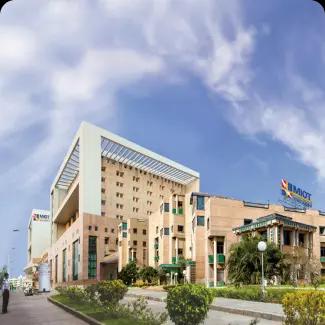
Oophorectomy
An oophorectomy is a surgical procedure to remove one or both of your ovaries. Your ovaries are almond-shaped organs that sit on each side of the uterus in your pelvis. Your ovaries contain eggs and produce hormones that control your menstrual cycle. An oophorectomy can also be done as part of an operation to remove the uterus (hysterectomy).
Free Pick up and Drop
No Cost EMI
Post Surgery Care
An oophorectomy is a surgical procedure to remove one or both of your ovaries. Your ovaries are almond-shaped organs that sit on each side of the uterus in your pelvis. Your ovaries contain eggs and produce hormones that control your menstrual cycle. An oophorectomy can also be done as part of an operation to remove the uterus (hysterectomy).
An oophorectomy may be performed for:
Symptoms
Types of conditions
There are six main types of Oophorectomy
Unilateral oophorectomy
Bilateral oophorectomy
Salpingo-oophorectomy
Bilateral salpingo-oophorectomy
Hysterectomy with salpingo-oophorectomy
Total hysterectomy with bilateral salpingo-oophorectomy
Unilateral oophorectomy
In this type of oophorectomy one ovary (of one side) is removed surgically .
Diagnosis
Before scheduling the surgery, your surgeon may ask you to have the following tests:
- Physical exam.
- Blood tests.
- Urine tests.
- Ultrasound.
- Magnetic resonance imaging (MRI).
These tests are performed in order to check the current condition of the individual and decide whether there is a need for surgery and that too what type of surgery .
Risk Factors
Bleeding- If you bleed too much during surgery, you may need blood transfusions.
Damage to nearby organs- Surgery could damage your bladder or bowel, but this is rare. It happens in less than 1% of all cases.
Infection - You could get one several days, or even several weeks, after surgery. It could cause a fever or redness and pain near the cut.
Hernia - sometimes the muscle near the cut gets weak.
Tumour rupture- Your tumor could burst, spreading cancerous cells into your body.
Retention of ovary cells - Your ovary cells could keep causing problems, like pain near your pelvis.
Loss of fertility - If both ovaries are removed, you’ll need a treatment like in vitro fertilization (IVF) to get pregnant.
Preparing For Surgery
- To prepare for an oophorectomy, your doctor may ask that you:
- Stop eating a certain number of hours before your surgery and limit liquids
- Stop taking certain medications
- Your surgeon will review the procedure with you and go over any instructions for pre-and post-operative care. Before scheduling the surgery, your surgeon may ask you to have the following tests:
- Physical exam
- Blood tests
- Urine tests
- Ultrasound
- Magnetic resonance imaging (MRI)
Treatment Details
There are various ways a surgeon can remove an ovary. Each procedure carries its own risk and recovery time:
-
Laparoscopic approach: the surgeon uses a small camera to look inside your abdomen. The surgeon makes other small 1-2 cm incisions on your skin to allow for removal of your ovary. This surgery has a smaller risk of infection and you usually recover faster. In some cases, the surgeon may perform the surgery with the assistance of a robotic arm moving the instruments (while the surgeon guides them).
-
Vaginal: This is also considered a minimally invasive approach, with a smaller risk of infection and faster recovery. Vaginal removal of ovaries is usually done at the same time your uterus is being removed through your vagina.
-
Laparotomy: In some cases, the surgeon decides that a larger incision is needed to complete the surgery. This incision is known as a laparotomy, and it involves cutting into your abdomen. Laparotomies, or bigger incisions, usually have a longer recovery time and higher risk of complications, although these are still low.
Recovery
-
If your surgeon performs your surgery using laparoscopy or a vaginal approach, you may be able to leave the hospital the same day. If you had a laparotomy, you will spend a few days in the hospital. Before leaving the hospital, you will be told how to clean and care for your incisions.
-
Everyone heals at different rates, but generally, you can expect at least two weeks of restricted activities. In the case of a laparotomy, it may take up to six weeks until you can resume your normal lifestyle. Some general rules after surgery may include:
-
No exercise (walking is OK).
-
No heavy lifting.
-
No sexual intercourse.
-
Use sanitary pads only (no tampons).
-
No baths (only showers).
-
Keep the incisions clean and dry.
-
Take pain medicine or antibiotics (to prevent infection) as directed.
-
Ask for help from family and friends during your recovery.
-
No driving (if you’re taking pain medication that impairs driving).
Your journey to good health begins here

Accredited Hospitals
Nationally accredited hospitals for high-quality care

Multi-language Support
Convey your needs in the language you're most comfortable in

Travel Booking Assistance
Seamless booking assistance for your healthcare journey

Personalised Treatment Plans
A treatment journey tailored to all your preferences and needs

Unparalleled Hospitality
Experience exceptional hospitality during your stay

Easy Medical Visa Approvals
Dedicated assistance for medical visa requirements
Plan your healthcare journey with Karetrip!
India’s Best Hospitals are Partnered With Karetrip
Access World-Class facilities from top Hospitals across India
Consult with India’s most experienced doctors
Experience premium care from India’s leading specialists

Dr. Alka Kriplani
Gynaecologist and Obstetrician
41+ Years Of Experience

Dr. Arwa Mohsin E
Obstetrician and Gynecologist
22+ Years Of Experience

Dr. Meenakshi Ahuja
Obstetrics & Gynaecology
36+ Years Of Experience

Dr. Rajesh Helavar
Obstretician And Gyneacologist
19+ Years Of Experience

Dr. G Usha Reddy
Gynaecologist & Obstetrician
33+ Years Of Experience

Dr. Poonam Rastogi
Obstetrician and Gynaecologist
31+ Years Of Experience
Cost Estimation
Learn about the expenses involved in the procedure and what factors affect them.

The cost of oophorectomy surgery in India typically ranges from INR 3,50,000 to INR 6,00,000 across various cities in India.
However, the final cost of surgery is estimated after considering multiple factors, including the experience and expertise of the doctor, the type of oophorectomy surgery, hospitalization charges, and other medical and non-medical expenses.
The cost of this surgery depends on various factors like location, hospital fees, surgeon fees, diagnostic tests, type of procedure etc. Our team can help you understand the precise costs based on your specific case and doctor’s recommendations.
The average cost of the Oophorectomy in India is around ₹3,50,000 to ₹6,00,000.

₹6,00,000
High Cost
₹5,50,000
Average Cost
₹3,50,000
Low Cost
The LIST of AVERAGE COST of the Oophorectomy across TOP 0 cities in India in Indian Rupee (INR) is as follows :
City
Lowest Cost
Average Cost
Highest Cost
Commonly Asked Questions
How does an oophorectomy affect the chances of having a child?
Removing one ovary won’t change your chances of becoming pregnant, assuming your other ovary and fallopian tube work normally. Removing both tubes and ovaries will mean that you’re not able to get pregnant on your own. You may need a treatment like IVF. People who have both fallopian tubes and ovaries removed and wish to have children should talk to a fertility specialist before the procedure about freezing eggs for future use.
Will an oophorectomy cause menopause?
Ovaries produce estrogen and progesterone, which help control the menstrual cycle. Removing both ovaries will cause menopause to begin immediately. It’s important to be prepared for symptoms of menopause before surgery. In addition to no longer having periods, menopause can cause:
- Hot flashes.
- Night sweats.
- Vaginal dryness.
- Osteoporosis.
What are the benefits of having an oophorectomy?
An oophorectomy benefits people who have specific medical conditions or diseases, or people who are at higher risk of developing ovarian cancer. Getting an oophorectomy can treat or minimize symptoms of these diseases or conditions, and prevent ovarian cancer in certain high-risk individuals.
Can your ovaries grow back?
No, your ovaries can't grow back.
What happens to your body after an oophorectomy?
Your body will go through different changes depending on the type of oophorectomy you had. If you haven’t reached menopause and had both ovaries removed, you’ll enter menopause immediately.

Do you still have a query?


"I had a successful surgery at Fortis Escorts Hospital, and it was all thanks to Karetrip's help in finding the right hospital for me. The entire process was smooth and stress-free, with Karetrip handling all the arrangements and answering any questions I had. The medical team at the hospital was outstanding, and the facilities were top-notch. I highly recommend Karetrip to anyone looking for a tension-free healthcare experience."
Read MoreFatima
Chattogram


"Thanks to Karetrip, I got connected with MAX Hospital in New Delhi. The team guided me through every step – from finding the right doctor to handling travel and visas. They made a daunting process feel like a breeze. The care I received at MAX Hospital was outstanding, and I can't thank Karetrip enough for making it possible. They truly put patients first and go the extra mile to ensure a smooth healthcare journey. I'm grateful beyond words!"
Read MoreHasan
Dhaka


"At first, I was unsure about having a medical procedure done in a foreign country. However, Karetrip's team at Indraprastha Apollo Hospital made me feel much better. The hospital was very clean, modern, and had everything they needed to help me. The staff were very kind and did everything they could to make me feel comfortable. I'm really happy with how my treatment turned out, and I appreciate Karetrip for making it easy and stress-free."
Read MoreImran
Sylhet
 Google Reviews4.9/5
Google Reviews4.9/5




I had a successful surgery at Fortis Escorts Hospital, and it was all thanks to Karetrip's help in finding the right hospital for me. The entire process was smooth and stress-free, with Karetrip handling all the arrangements and answering any questions I had. The medical team at the hospital was outstanding, and the facilities were top-notch. I highly recommend Karetrip to anyone looking for a tension-free healthcare experience.
Fatima
Chattogram
 Google Reviews4.9/5
Google Reviews4.9/5



















